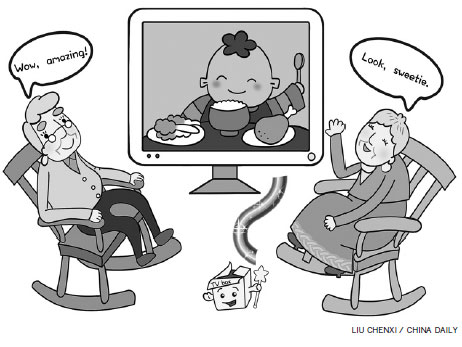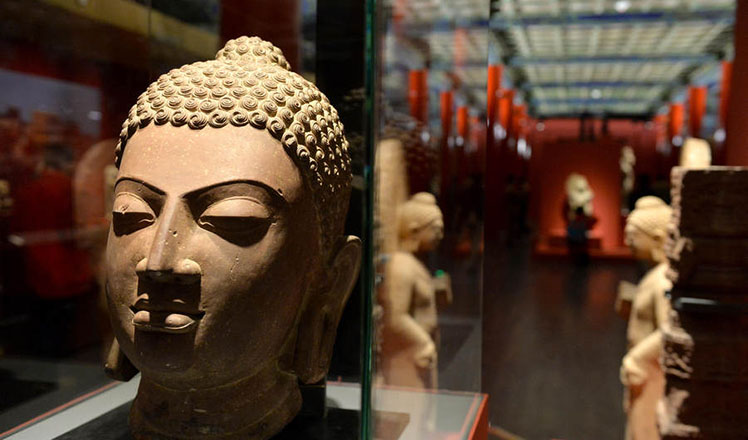Empty-nesters enter the smart age with smarter devices
Updated: 2016-10-03 08:40
By Han Qiao From China Features(China Daily)
|
||||||||
Every time Ai Yuanxi switches on the TV, the first pictures she sees are those from her son. He lives in Berlin and sends pictures of Ai's 16-month-old grandson to her TV every day.
"It's amazing that you can receive pictures on TV," says the 65-year-old grandmother, who lives in Hangzhou, Zhejiang province. "It's handy and the pictures are much larger than those on cell phones or computer screens. It's like my grandson is right in front of me."
Ai's TV has a set-up box specially designed for the elderly. The TV has some computer functions, but the remote control pad makes it much easier to use. More importantly, she won't suffer from neck pain or strain her eyes even if she spends hours in front of the TV. As China's population ages, some internet-based products are becoming easier to use for the elderly who are less familiar with the technology. These smart products can help parents and their children maintain a comfortable distance, while continuing their close bond without getting involved in each other's life too much.
China has the largest population of senior citizens in the world. By the end of last year, it had 222 million people aged 60 or above, accounting for 16.1 percent of the total population, according to the Ministry of Civil Affairs.
The number of "empty-nesters", parents whose grown-up children work and live in other Chinese cities or abroad, is rapidly growing. Contrary to popular belief that this phenomenon is more or less limited to smaller cities, the problem is no less serious in big cities. In fact, it is even more complicated, particularly among families with well-educated children who are settled or working abroad.
Jiang Feng, founder of Judou Technology Company, says the buyers and users of the Judou TV box are different. Buyers are mostly in their 30s while the users are their parents who are in their 60s. "Many children feel sad when they have to leave their parents. The device offers away to stay connected," Jiang says.
The box enables a person to download a film from the internet directly to their parents' TV, which might be thousands of kilometers away. It also makes it possible for parents to video chat. Parents can video chat with their children's families on TV while the children can answer video calls on their cell phones any time.
Jiang says senior citizens, just like young people, are curious about new technology but are intimated by the fear of failing to use it. "So when designing products for them, my guiding principle is making them easy to use."
Liu Bei (alias), 77, won't let her husband take a walk by himself if he doesn't wear a watch which can also be used as a cell phone - with a button for emergency calls - and a GPS. Her 87-year-old husband, who has shown early signs of Alzheimer's, fell down one day while taking a walk. He pressed the emergency button, sending an instant alert to the cell phones of Liu, and their son and daughter-in-law. Liu rushed downstairs and found him using the GPS tracker.
Her husband also has a number of chronic conditions. He needs to take tablets twice a day for hypertension and suffers from an irregular heartbeat. But when his heartbeat accelerates, he cannot take the tablets.
The government has announced policies to encourage the development of smart products to help address the challenges of an aging society. Du Peng, professor of aging studies at Renmin University of China, says smart devices help the elderly through daily life, but the supply of products is insufficient and many are too complicated for senior citizens.
The next stage of development, says Du, should see smart devices connected to local medical and other services for the elderly. In a medical emergency, nearby medical centers could be informed immediately, speeding up the process of help.
Ai Yuanxi occasionally travels abroad. She has visited her son in Europe, and has been to Egypt and the Republic of Korea. She stores her photos on a Judou box. She often rolls the pictures, recalling fond memories, on the TV screen accompanied by music. "It makes me feel very happy," she says.
"Innovation in smart technology helps the elderly live more interesting and dignified lives," Du says, which truly is invaluable for our senior citizens.

- China urges G20 to implement Hangzhou consensus
- Trump hit by his own lewd remarks about women
- 2016 Nobel peace prize provides hope to Colombian people: UN chief
- Hurricane Matthew leaves nearly 1.2 mln in US Southeast powerless
- Chinese community in US slams rap song
- Lagarde urges boost to growth, warns of protectionism

 Top 10 Chinese cities with 'internet plus transportation’
Top 10 Chinese cities with 'internet plus transportation’
 New energy cars shine at Paris Motor Show
New energy cars shine at Paris Motor Show
 23 baby giant pandas make debut in Chengdu
23 baby giant pandas make debut in Chengdu
 Heritage list salutes Chinese architecture
Heritage list salutes Chinese architecture
 Happy hour for prince and princess in Canada
Happy hour for prince and princess in Canada
 Chinese and Indian sculptures on display at the Palace Museum in Beijing
Chinese and Indian sculptures on display at the Palace Museum in Beijing
 Rescue work at the typhoon-hit provinces
Rescue work at the typhoon-hit provinces
 Wonderland-like sunrise in East China
Wonderland-like sunrise in East China
Most Viewed
Editor's Picks

|

|

|

|

|

|
Today's Top News
Trump outlines anti-terror plan, proposing extreme vetting for immigrants
Phelps puts spotlight on cupping
US launches airstrikes against IS targets in Libya's Sirte
Ministry slams US-Korean THAAD deployment
Two police officers shot at protest in Dallas
Abe's blame game reveals his policies failing to get results
Ending wildlife trafficking must be policy priority in Asia
Effects of supply-side reform take time to be seen
US Weekly

|

|







